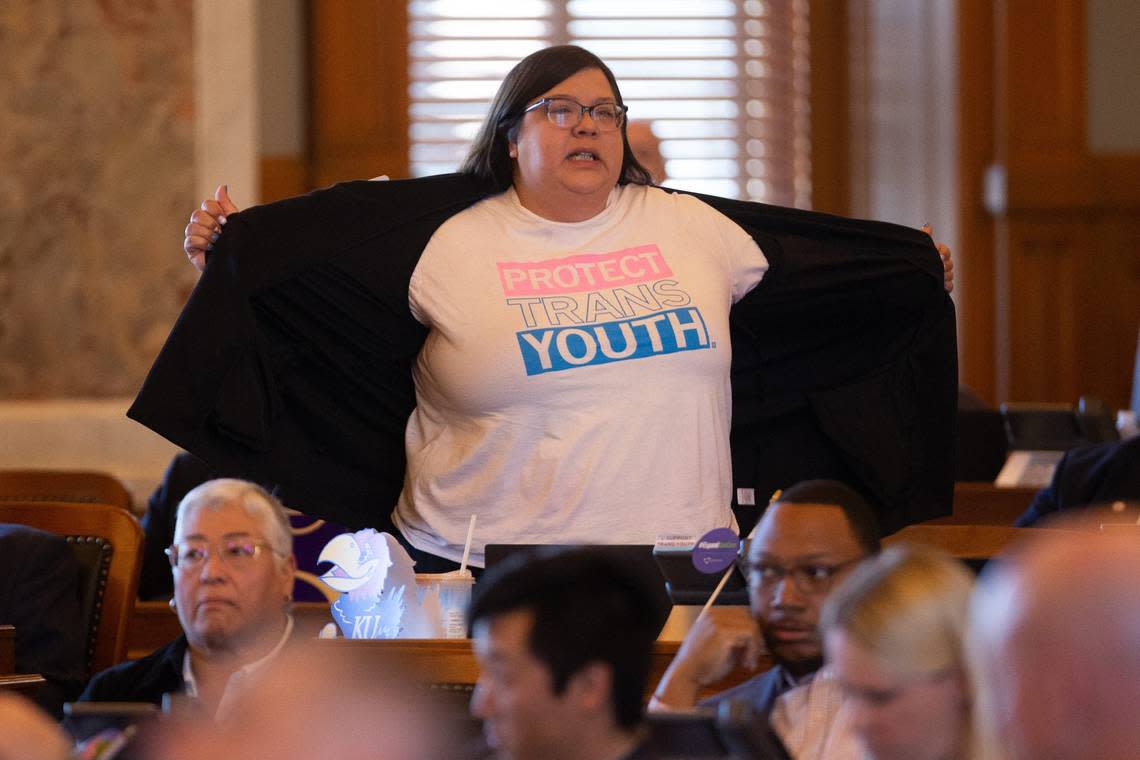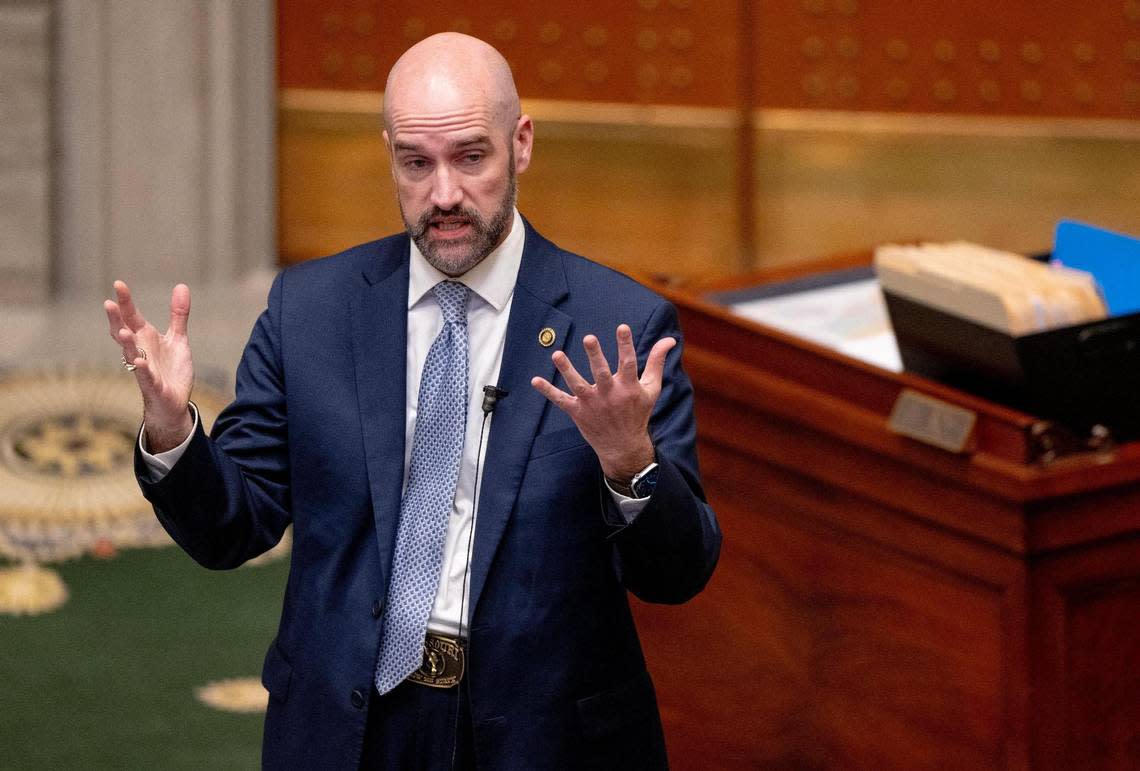‘It’s not a safe situation’: Transgender Kansas Citians’ rights under attack from two states
Heidi Schultz, a 44-year-old transgender woman who lives in Kansas City, is stuck between two states pushing to regulate the most intimate parts of her life.
In Missouri, where she fills her prescriptions for gender-affirming care, she fears losing access to the medications under an emergency rule that would severely restrict transgender health care. And then when she crosses into Kansas, where she works as an adjunct art professor, she worries she could be arrested for using the women’s bathroom.
“If these rules and laws keep getting passed, and they hold up in court, then this isn’t an OK place to be. It’s not a safe situation,” Schultz told The Star, later adding, “It’s an awful, awful feeling.”
The Kansas City metro area has become a new ground zero in the battle over transgender rights. The sprawling, bustling region is divided between two states where legislators and state officials are seeking to regulate the lives of transgender residents and restrict their health care.
The emergency rule in Missouri that would effectively ban gender-affirming care is currently blocked through at least July 24 by a court order that was extended last week, but could still eventually be allowed to go into effect. In Kansas, a new law requiring trans people to use restrooms and other public accommodations based on their sex at birth will go into effect in July, but includes no criminal penalties or other enforcement mechanism.
Amid the uncertainty, trans people fear a looming crackdown on their ability to freely live out their identity no matter which side of State Line Road they reside.
The Star interviewed more than a dozen trans residents, activists, physicians, attorneys, lawmakers and others about the current, precarious moment. Collectively, they voiced an acute sense of worry about how long gender-affirming care would remain available, with some transgender residents saying enforced bans would prompt them to leave the area.
“I’m starting to think — do I need to move my pharmacy to another state or get them shipped?” Schultz said. “Those are all things that I’m starting to think about.”

But even beyond worries about access to care, the restrictions across Kansas and Missouri are fueling an atmosphere in which trans people feel unwelcome. As they watch politicians in both states try to regulate their lives, trans residents wonder if they will eventually be pushed into the shadows.
“It feels like we’re just going to disappear silently from the state,” said Kale Marie Michael, a 21-year-old trans woman and an organizer, along with Schultz, with the KC Trans Coalition, a newly formed community advocacy group.
“And at some point nobody’s going to even remember and that really scares me because there are so many wonderful, beautiful, vibrant people in the trans community in Missouri and Kansas.”
Kris Humphreys, a primary care physician who provides gender-affirming care for adults in the Kansas City region, said they have heard from seven patients in roughly the last week who are moving out of the area because they don’t feel safe.
“This care cannot ethically be provided in the state of Missouri with these mandates,” said Humphreys, who uses they/them pronouns. Humphreys is licensed in both Kansas and Missouri but sees patients in Kansas.
“I know that some providers are going to try because of how important this treatment is and how hard it is for patients to get it elsewhere. But we’re up against what what is medically ethical. We’re going against all of our licensing boards, all of our certifications, all of the major medical societies and organizations. Against all of that.”

Aggressive push for restrictions
Kansas and Missouri legislators, as well as some state officials, have pushed restrictions on trans people more aggressively this year than at any other time, part of a national wave of Republican legislation to regulate the lives of trans people and restrict their access to gender-affirming care.
Trans athletes are now banned from competing in girls’ sports in Kansas. And a sweeping, first-in-the-nation law passed by the GOP-controlled Legislature over Democratic Gov. Laura Kelly’s veto requires trans people to use restrooms and other public accommodations based on their sex at birth.

In Missouri, state Attorney General Andrew Bailey, a Republican, is attempting to effectively ban care for both children and adults through emergency regulations. The rules are on hold until for at least two months. A hearing is scheduled for July in St. Louis County Circuit Court.
Republican Gov. Mike Parson, who appointed Bailey, has promised to call a special session of the General Assembly if it doesn’t pass a ban on trans athletes and restrictions on gender-affirming care before the regular session ends May 12. Republican lawmakers, who hold commanding supermajorities, are divided on how far to go in restricting gender-affirming care but appear to broadly agree that access for children should be sharply curtailed.
Missouri Senate President Pro Tem Caleb Rowden, a Columbia Republican, said children are not equipped to make the decision to begin transitioning. Rowden, like many GOP legislators, wants to restrict gender-affirming care for minors but disagrees with Bailey’s proposed restrictions on adults.
“The number of folks who are now making claims and starting the process of going down the road of being transgender is higher than it’s ever been and it’s increasing at a dramatic rate. It’s in the forefront of society, anybody would be crazy not to admit that,” Rowden said.

About 1.6% of U.S. adults say they are transgender or nonbinary, according to a 2022 Pew Research Center survey. At the same time, 5.1% of people ages 18-29 say they are trans or nonbinary.
Some Republicans have gone much further rhetorically than Rowden and refused to recognize the existence of trans people. That has fed into the current widespread unease among trans residents about where the efforts of GOP officials will lead.
“It doesn’t take a medical degree, it doesn’t take an engineering degree to know the difference between men and women and the understanding that having someone cut off your genitalia does not change whether you are a man or a woman,” Missouri Secretary of State Jay Ashcroft, a Republican candidate for governor, said during a CNN interview last month in which he also said he disagreed with prohibiting adults from accessing care.
The American Medical Association has said trans and nonbinary gender identities are normal variations of human identity and expression. But receiving gender-affirming care doesn’t necessarily mean undergoing surgery. A 2017 paper in the journal Endocrine Practice found that most transgender patients seen by endocrinology clinics have not undergone any type of gender-affirming surgery. About 35% of patients had had at least one surgery.

Polling of Kansas and Missouri residents about their attitudes toward trans people is limited. What little recent public polling available focuses on the participation of transgender athletes in women’s sports.
A poll of Missouri voters conducted last summer by St. Louis University and British pollster YouGov found that 65% of those surveyed were against allowing trans student-athletes to play on teams that match their gender identity. The results were largely split along party lines with 91% of Republicans against and 31% of Democrats against.
In Kansas, nearly 67% of respondents said high school athletes should compete in sports on the basis of their gender at birth, according to a fall 2022 survey conducted by the Docking Institute of Public Affairs at Fort Hays State University.
‘We know they won’t win’
Missouri’s only openly gay state senator, Kansas City Democrat Greg Razer, said Republicans in Jefferson City and Topeka have somehow “discovered that trans people exist all of a sudden.”
“We always lose the battles at the beginning,” Razer said. “Never ever, ever, these far-right radicals who try to dismiss who we are as a community, as human beings, never have they won and they won’t win this one. And we know they won’t win by history.”
Restrictions on gender-affirming care for children failed in the Kansas Legislature this year, after Kelly vetoed a bill that included a ban. But bills sometimes take several years to become law, leaving transgender residents, their family members and advocates to wonder whether it’s simply a matter of time before supporters of a ban can marshal enough support to override a veto.

For example, Kansas lawmakers passed a ban on trans athletes in girls sports several times in recent years before supporters finally gathered enough votes to override Kelly’s veto this spring.
Adam Kellogg, a 19-year-old trans activist and University of Kansas student who has testified in the statehouse against anti-trans legislation, said he has made contingency plans for if care is ever no longer available in the area.
Even though care restrictions failed, the Legislature successfully overrode Kelly’s veto of a measure supporters call the “Women’s Bill of Rights,” which requires transgender individuals to use restrooms based on their sex at birth. The requirement extends to domestic violence shelters, rape crisis centers and locker rooms. It doesn’t include criminal penalties for violations or explicitly authorize lawsuits, leaving it unclear how it will be enforced.
“It just seems discriminatory for the sake of being discriminatory. I cannot picture a single person this would actually help,” Kellogg said.
The new law may also stop transgender Kansans from changing their gender on official IDs once it goes into effect July 1.
“Now we’re saying to folks, who you know youth and adults alike, you can transition and you can get the gender-affirming care that you need but it’s going to be illegal for you to go to the bathroom and if you are sexually assaulted you can’t go to a domestic violence shelter that matches your gender identity that you probably lived with for numerous years,” said Kansas state Rep. Heather Meyer, an Overland Park Democrat whose child is trans.

Lane Rozin, a 19-year-old trans man who attends the University of Kansas, plans to continue using men’s restrooms despite the new law. He predicted the law will backfire, saying it won’t have the effect its supporters intend because it will lead to trans people using restrooms that don’t match their gender identity.
“There is no world that I can imagine where I would walk into a woman’s restroom and it would be a positive experience for me or anyone else in it,” Rozin said.
Rozin said he came out as transgender in 2018 and has been on hormone therapy for almost four years. Last summer, he had what is often called top surgery, which for trans men involves the removal of breast tissue.
Reflecting on his own transition, Rozin voiced concern for transgender people in Missouri and their ability to access care amid Bailey’s attempted clampdown.
“I remember years ago before I started any part of medical transition and being so scared that I would never be able to get there. So I know that there’s a lot of Missouri youth and even trans youth and trans elders who are very concerned for their own well being,” Rozin said.
Fears over future of gender-affirming care
Brandon Barthel, a Kansas City-based endocrinologist who provides gender-affirming care for adults, said he has heard from multiple patients who are considering their options for leaving the region. Some have spoken about moving to Colorado or the Pacific Northwest, he said.
Patients who have been on hormone therapy for many years are wondering what will happen to them. It’s been hard to give patients answers, “because we don’t really know,” he said.
Barthel said he’s the primary person prescribing hormones at his clinic, but there’s been a lot of huddling with other staff and their legal team to decide how to proceed. Bailey’s inclusion of adults in his emergency rule came “out of the blue,” Barthel said, because the messaging had been so focused on “protecting the children.”
Asked about his decision to extend his rule to adults, Bailey’s office has said it has “serious concerns about how children are being treated throughout the state, but we believe everyone is entitled to evidence-based medicine and adequate mental health care.”
Kansas City Mayor Quinton Lucas has said that medical providers should ignore Bailey’s rule if it goes into effect. Barthel said it’s not so clear.
“Some people, just ethically speaking, talk about how you have the duty to not obey an unjust law — which sounds good on paper until you’re potentially staring down the barrel of investigation or prosecution, and then it’s a lot scarier,” Barthel said.
“We’re going to continue to do everything in our power to provide that care,” he said. “And it’s unfortunate that it’s been politicized and been turned into the spectacle that it is.”

Schultz, the trans woman from Kansas City, said the recent push by Republicans has caused her to consider moving out of the city, where she has an art studio in the West Bottoms and a strong local support network. She has applied to jobs in California and has also weighed leaving academia.
But her search is complicated. Schultz knows she can’t move to southern states such as Tennessee, Kentucky, Texas and Florida, where lawmakers have also pushed anti-trans legislation.
Schultz said people tend to be more against anti-trans legislation when they know a trans person. She wishes people would be more compassionate and understanding of her community.
“When you’re talking to people that maybe aren’t exposed to us or have any experience or know anybody, it’s like abstract and far away,” she said. “Maybe they just don’t realize that we’re just people. We’re not, you know, weird monsters.”
Bailey’s gender-affirming care restrictions may eventually be permanently blocked in court, although that’s not guaranteed. A hearing is scheduled for July 20 in front of St. Louis County Circuit Court Judge Ellen H. Ribaudo, who will decide whether to issue a preliminary injunction that would keep the rule from going into effect during litigation that could last months.
Still, even if a court throws out the ban, lawmakers could pass their own version, which might be more difficult to overturn.
Amid that uncertainty, Gabriel, a 19-year-old transgender man in Kansas City who is also with the KC Trans Coalition, said he’s heard of people considering moving their prescriptions to Kansas. Gabriel, who asked that only his first name be used, said he is on Medicaid and doubted he could do the same.
“Missouri, it feels like it’s just turning into a really backwards place,” Gabriel said.
Tonya Claiborne, a 58-year-old trans woman from Springfield, said the restrictions on gender-affirming care were intentionally vague, causing intense anxiety in the trans community.
“The purpose is to confuse people and keep people from getting care and being not sure what kind of care they can get,” she said. “And that’s part of the cruelty of it.”

Kansas IDs targeted
In Kansas, trans people and advocates are scrambling to prepare for the “Women’s Bill of Rights” law.
Equality Kansas, an LGBTQ advocacy group, held a virtual clinic with Kansas Legal Services last week to inform people how to change the gender markers on their birth certificates and driver’s licenses before the law goes into effect July 1.

Opponents of the law have questioned whether it violates a 2019 consent judgment in federal court requiring Kansas officials to issue new birth certificates to trans residents. Kelly spokesperson Zach Fletcher said last week that legal teams are reviewing the legislation “and will determine how to proceed.”
Shelly Skeen, a senior attorney at the LGBTQ-focused legal firm Lambda Legal, said the judgment is binding on state officials. Lambda Legal and other groups, such as the ACLU, haven’t said yet whether they will sue over the law before it goes into effect.
“What is hard for me to understand, even though I do this work, is why does it matter to anyone?” Skeen said of the push to stop transgender people from changing their IDs.

For now, the Kansas City region sits in a kind of twilight moment.
The new restrictions in Kansas and Missouri haven’t gone into effect yet. But the countless trans people who call the metro home are just a few weeks or one court ruling away from having their lives upended.
“It’s like you’re being separated on purpose. You’re being othered. You’re being put into a different category — that, you know, you’re not quite the same as everybody else,” Schultz said.
“Ask yourself, is this the right thing to do?”
The Star’s Daniel Desrochers and Katie Bernard contributed reporting.
